Gold Coast residents can volunteer for free puppies, all costs covered, and help individuals in need
It sounds too good to be true, but it’s fur real. Coast residents can volunteer for free puppies, all costs covered, and help individuals in need. But there’s a catch …
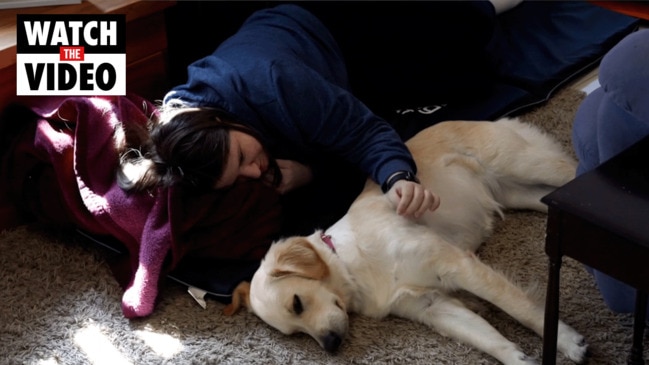
Gold Coast
Don't miss out on the headlines from Gold Coast. Followed categories will be added to My News.
Who wants a free puppy?
After years of a pandemic puppy drought that sent pet prices sky-high, it seems almost too good to be true.
But this is neither a joke nor a trick question, but actually a very serious situation.
On offer are beautiful pedigree Labradors and Golden Retrievers, and you don’t have to pay a cent.
In fact, all costs are covered – including food and veterinarian bills. All you have to give is your time.
Oh, and one other thing … you have to give the puppy back.
Assistance Dogs Australia is in desperate want of volunteers as soaring demand for their animals means they have had to close their waitlist.
From clients with physical disabilities to those with PTSD and autism, the number in need is literally incalculable.
ADA Gold Coast instructor Carri Robinson says increasing the number of volunteer puppy educators is the only solution.
And that’s where the free puppies come in.
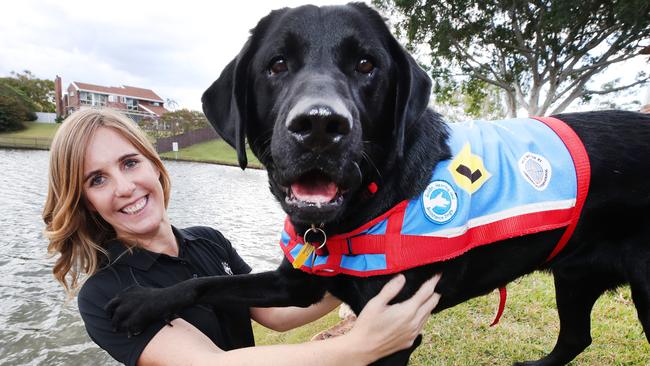
Carri says while it might sound like a dream deal, it’s not as easy as it sounds.
But she’s also the first to admit the experience is even better than might be imagined, even with the extra effort required to create a true working dog.
“The Puppy Education program usually begins from 8 weeks of age and continues until the dog is 12 to 18 months old, when they move on to advanced training,” says Carri.
“The aim of the program is for the foster carer to help socialise and educate the puppy in basic skills, everyday life and outdoor experiences, as well as teaching good house manners.
“All costs are covered for the volunteer because they are giving the gift of time. The difficult part for many is that the puppy really can’t be left alone for more than four hours at a time, it doesn’t matter who is at home, as long as someone is.
“Alternatively, the puppy can accompany the volunteer to their workplace, it’s actually great for training and most workplaces love it.
“The hardest part of the whole program though is saying goodbye to the puppy after a year of loving it. But it’s such a wonderful experience for the volunteers, especially those who are wondering whether a dog is right for their family. And the best thing is that you know you are giving back to the community.
“You know you are sending that dog on to help a child with autism or learning disabilities, or a veteran who experienced PTSD, or someone with physical disabilities who wants more independence in their life. It’s a win/win all around.”
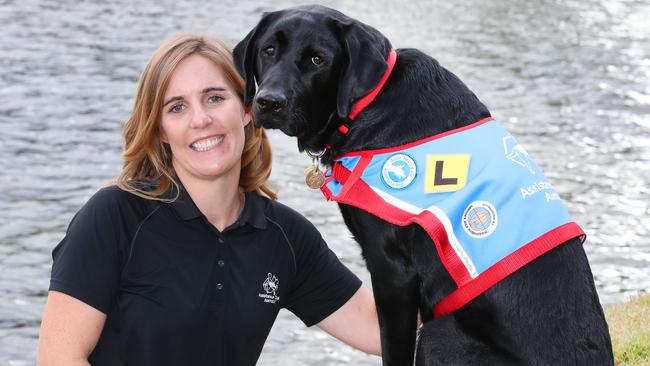
With a bumper crop of puppies expected soon, Carri says volunteers can also opt for a second puppy for double the love.
She says for those who can’t commit to the year-long program, a shorter-term option is the puppy carer program, where volunteers look after a dog while the educator is away.
She says these homestays can be as brief as a weekend or as long as a few weeks.
Once graduating from their home placements, Carri says the dogs complete their advanced training at ADA’s national school in Sydney, before being matched with clients in need.
“When you see that first meeting between dog and client and you realise it’s a match, it’s amazing. You really see love at first sight,” she says.
“We take a lot of care when it comes to matching, not all dogs suit all clients. You need to be very aware of the temperament of both and how they work together to get the best outcome.
“But when you do, there is nothing more beautiful.
“I would say the best part of my job is the placement of the dog with the client. You see all the hard work of the volunteers and team members become life-changing for the client, and it’s only the beginning of their journey.”
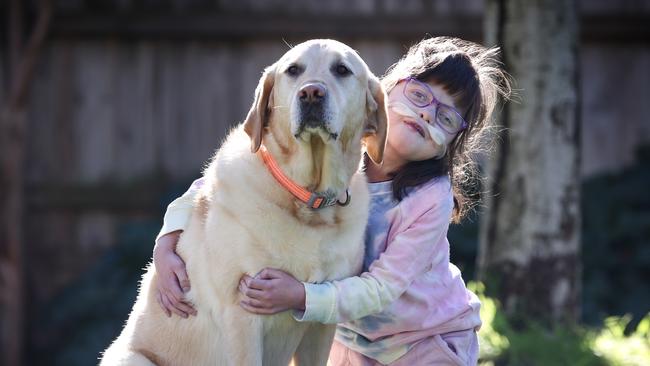
Carri says assistance dogs can pick up items, open and close doors, press buttons on the lift, as well as apply physical pressure when a client needs ‘grounding’, or can act as a physical barrier in public, especially for clients with PTSD or with sensory issues.
She says studies have shown that dogs help regulate emotions and decrease stress while actively increasing safety, such as helping a child with ASD learn road safety, and also increasing social awareness, such as encouraging sharing and turn-taking.
But she says perhaps the greatest service they perform is increasing social interaction and independence for clients.
However, be warned, hearing of the difference these dogs make in their clients’ lives can cause some unregulated emotions … such as tears.
There’s Luis, who was medically retired from the police force due to PTSD and was struggling despite treatment and therapy … and then Piper entered his life.
The chocolate labrador has been a lifesaver for Luis, who describes her as his ‘offsider’, the title police give to the officer who backs them up.
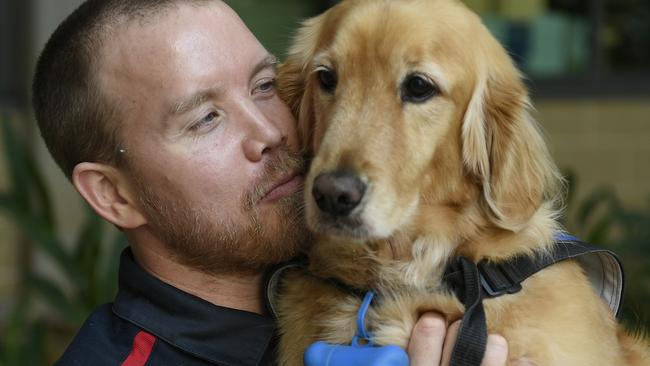
Then there’s Caleb, an eight-year-old boy living with autism who faces daily challenges and difficulties.
But the addition of Holly, a yellow labrador, to his family has turned their world upside down – or maybe right side up.
Caleb believes he and Holly share a secret language. He says he knows what she is thinking and feeling through her expressions, her licks and her movements. His special connection with her, in turn, helps him correct his behaviour.
Just one week after Holly’s arrival, she moved into Caleb’s room to sleep. It was then that Caleb began staying in his own bed and stopped getting up during the night. Now each evening, Holly ‘puts Caleb to bed’, stays with him until he is asleep and then settles down on her own bed.
Holly also acts as a channel of communication to Caleb, especially for his parents. Requests and instructions that were previously met with anger and meltdowns are now defused by the assistance dog.
Carri says one of the most incredible programs run by ADA is Pups in Prison, which sees inmates at the Southern Queensland Correctional Centre participate as puppy educators, helping to train the dogs who will go on to help others in the community.
“It’s a program that helps everyone. It helps us train dogs, which then helps our clients, but it also helps the inmates.
“Not only is it true restorative justice, whereby they are giving back to society, but it also helps them on a personal level. It builds both trust and their self-respect, it’s magic to watch.”
Of course, Carri admits there is no part of her work that she does not love.
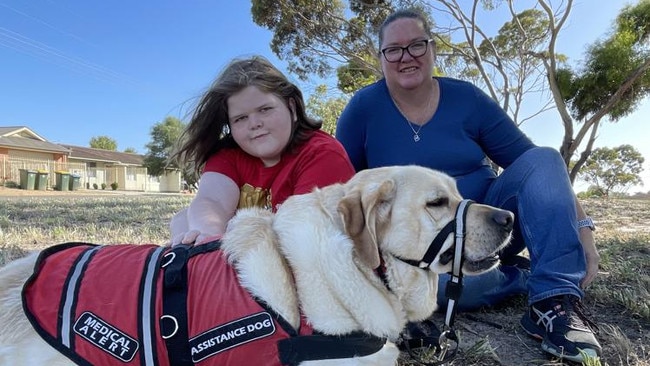
Passionate about animals her whole life, her first job as a teenager was working at a dog groomer.
Now as an instructor and trainer at ADA, she says not a day goes by that someone doesn’t say they wish they had her job. And she has to agree.
She says the only thing she would change is public awareness of the role and rights of service dogs.
“Assistance dogs are medical aids, it takes years of training to be qualified,” she says.
“Our dogs are granted full Public Access Rights, allowing them to accompany their human almost everywhere, and they have to pass an annual test to keep that.
“It’s unfortunate but there sometimes are still cases where our clients are told their dogs are not allowed, but there is legislation that protects them.
“I think overall society is very welcoming to all dogs, we would just love people to understand more about how and why these dogs need to go everywhere with their owner.”
Of course, there is one more wish on Carri’s list … more volunteers for those free puppies.





